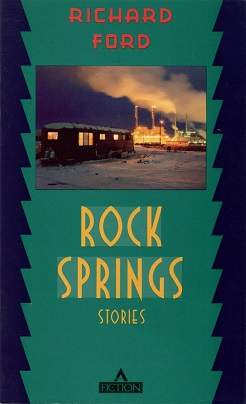books
Books like Rock Springs
Rock Springs
Richard Ford
3.8/5
Richard Ford with Raymond CarverThis collection of ten short stories published as part of the 1980s Vintage Contemporaries series is Richard Ford at his best. Certainly, Ford would go on to write a string of first-rate novels, but these short stories are some of the finest American realist fiction I’ve come across. I had a blast doing a brief write-up of three of the ten:Rock SpringsEarl tells us first off how he’s headed down from Montana to Florida where he could hook up with old friend who wouldn’t turn him into the police. There’s this issue Earl has with a number of bad checks which could mean serious prison time. Anyway, sitting in the front seat next to Earl is Edna, a woman he’s been living with for the past eight months since she needed a man around to keep her crazy ex-husband Danny from breaking into her house to steal things, Danny being real needy since he took the kids. In the back seat is Earl’s little girl Cheryl along with her little dog, Duke. Halfway down through Wyoming, Earl is hit with a stroke of bad luck: the oil light starts flashing on the dash of the car he stole. We read, "I’d gotten us a good car, a cranberry Mercedes I’d stolen out of an ophthalmologist’s lot in Whitefish, Montana. I stole it because I thought it would be comfortable over a long haul, because I thought it got good mileage, which it didn’t, and because I’d never had a good car in my life, just old Chevy junkers and used trucks back from when I was a kid swamping citrus with Cubans.” Sidebar: Along with a few other American fiction writers from the 1970s and 1980s such as Larry Brown and Raymond Carver with their lower-middle-class characters, Richard Ford has been labeled a “dirty realist.” This collection of stories, “Rock Springs” serves as a prime reason. Also, if the tenor of this story reminds you of the Coen brothers, films like Fargo or The Big Lebowski, there’s a good reason: both Ford and the famous filmmakers feature down-and-out offbeat characters who frequently live outside the law as they deal with oddball happenings and events. There’s plenty more color as the story continues, including Edna recounting her tragic tale of what happened to a spider monkey she once brought home after winning the monkey in a game of dice and Earl stopping to make a call in the mobile home of a big Black woman caring for her brain damaged grandson, a home that’s part of a mobile home community next to an honest-to-goodness gold mine. Oh, Earl, a gold mine – so close, yet so far away. I can assure you, this story is an honest-to-goodness Richard Ford gold nugget. Going To the Dogs“My wife had just gone out West with a groom from the local dog track, and I was waiting around the house for things to clear up, thinking about catching the train to Florida to change my luck. I already had my ticket in my wallet.” So begins this story that is vintage oddball; matter of fact, as I was reading I was imagining how easily the unfolding events could be filmed by the Coen brothers. The narrator then goes on to tell how it is the day before Thanksgiving and hunting season with hunters and their old Chevys and pickups parked along the street below. Our narrator, a man named Lloyd, hears a knock and opens his front door – standing on the frozen grass are two fat women, dressed like hunters, along with a dead deer. The two fat women want to give Gainsborough, the owner of the house, a deer steak. Lloyd tells them Gainsborough isn’t here, he’s in England. He invites the fat women in for some coffee and then the fun begins, including a lively sweet-sour discussion about tracking dear and a comic roll in bed with one of the fat women, Bonnie, who insists on calling him Curly instead of Lloyd. With its quirky dialogues and off-center descriptions, this story highlights how Richard Ford’s writing displays a careful concern for subtlety, nuance and the rhythms of language. A superb example of the Writer’s craft. CommunistA moving tale told by our forty-one year old narrator, reflecting back on a vivid memory, a day when he was sixteen and taken on a hunting trip by a Vietnam vet turned communist, a man named Glen Baxter. At the time Glen was seeing his attractive thirty-two year old widowed mother, who also came along on the hunt, although she spent most of the time in the car they drove to wetlands where there were thousands of snow geese out on a lake. Rich atmosphere in this Richard Ford story, as when we read: “I put down my gun and on my hands and knees crawled up the earthwork through the wheatgrass and thistle, until I could see down to the lake and see the geese. And they were there, like a white bandage laid on the water, wide and long and continuous, a white expanse of snow geese, seventy yards before me, on the bank, but stretching far onto the lake, which was large itself – a half-mile across, with thick tules on the far side and wide plums father and the blue mountain behind them.” Not only the sights, smells and sounds but also the unfolding drama between narrator, mother and Glen Baxter prompts us as readers to appreciate how this day made such an enormous impact.

Filter by:
Cross-category suggestions
Filter by:
Filter by:
Filter by:
Filter by:
Filter by:
Filter by:
Filter by:
Filter by: